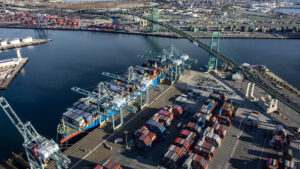The starting point of any discussion about tariffs is their bad reputation.
Wikipedia says (here), “There is near unanimous consensus among economists that tariffs are self-defeating and have a negative effect on economic growth and economic welfare.”
However, the same Wikipedia article also says the 1930 Smoot-Hawley tariffs have been wrongly blamed for the Great Depression.
Still, trade barriers raise costs and hinder growth. So why is Trump so enthusiastic about tariffs? The answer partly lies in who he listens to. That would be Stephen Miran (bio here), a Wall Streeter and conservative think tanker whom Trump has chosen to chair his Council of Economic Advisers.
Conventional wisdom is that tariffs are paid by importers, who pass them along to consumers, and if enacted will increase inflation.
But Miran argued in a 2024 paper (read it here) that foreign producers, not the importing country, bear the cost of tariffs when currency exchange effects are taken into account. (See Barrons magazine, Jan. 20, 2025 print edition, page 7.)
Other economists don’t buy this, so what’s his thinking? He claims the U.S. dollar’s status as the world’s reserve currency results in its “persistent overvaluation,” which hurts U.S. manufacturers, and tariffs are how you correct this. Scott Bessent, Trump’s treasury secretary nominee, appears to share Miran’s ideas on this subject.
So that’s the basis of Trump’s tariff policy. Trump himself has famously argued all along China (and other countries) will pay for his tariffs. (He also claimed Mexico would pay for his border wall, which didn’t happen.) If he’s right, tariffs could reduce deficits without raising taxes, and return manufacturing jobs to our shores.
But even if Marin is right that tariffs are a means to weaken the dollar in international transactions, tariff proponents “should be careful what they wish for,” Barrons said, because global demand for U.S. assets (Treasury bonds, etc.) allows Americans “to consume more than they produce” and helps “finance the massive federal budget deficit.”
But what is Trump’s tariff policy? Even Wall Street, at this point, doesn’t know. That’s because Trump is holding his cards close to his chest.
The media initially reported he intends to impose tariffs on China, Canada, Mexico, and European countries. But lately the media have been suggesting he plans to use the threat of imposing tariffs as negotiating leverage to get trade and other concessions; and the Barrons editors, too, think that’s what he’s up to. We’ll see.
The world economy is extremely complex, but we can say this much with assurance: In global finance, as in physics, for every action there’s a reaction.
Here’s another saying: Proof is in the pudding. If Trump does impose sweeping tariffs on foreign goods, and you find yourself paying a lot more for clothing, appliances, and electronics, he and you will know he listened to the wrong people.
Photo below: The Port of Los Angeles
